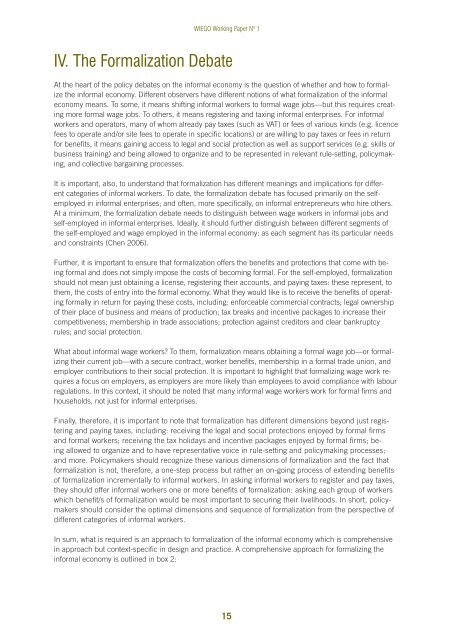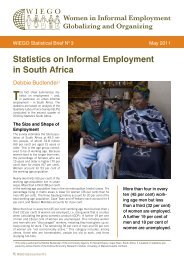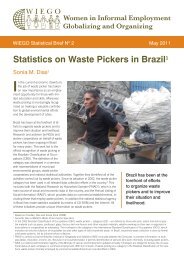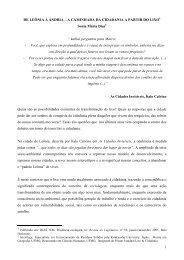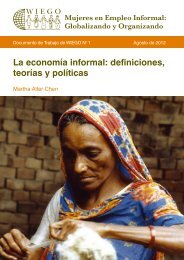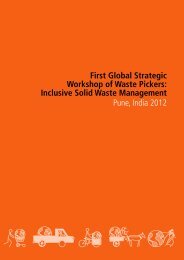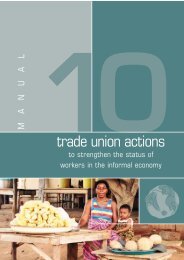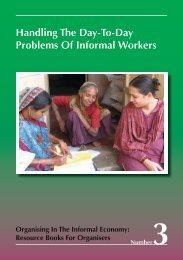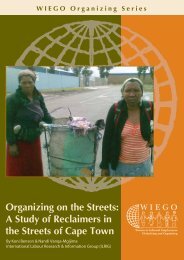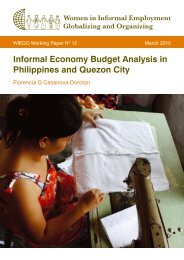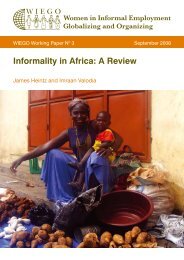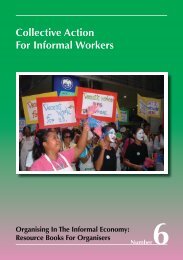The Informal Economy: Definitions, Theories and ... - Inclusive Cities
The Informal Economy: Definitions, Theories and ... - Inclusive Cities
The Informal Economy: Definitions, Theories and ... - Inclusive Cities
You also want an ePaper? Increase the reach of your titles
YUMPU automatically turns print PDFs into web optimized ePapers that Google loves.
WIEGO Working Paper N o 1<br />
IV. <strong>The</strong> Formalization Debate<br />
At the heart of the policy debates on the informal economy is the question of whether <strong>and</strong> how to formalize<br />
the informal economy. Different observers have different notions of what formalization of the informal<br />
economy means. To some, it means shifting informal workers to formal wage jobs—but this requires creating<br />
more formal wage jobs. To others, it means registering <strong>and</strong> taxing informal enterprises. For informal<br />
workers <strong>and</strong> operators, many of whom already pay taxes (such as VAT) or fees of various kinds (e.g. licence<br />
fees to operate <strong>and</strong>/or site fees to operate in specific locations) or are willing to pay taxes or fees in return<br />
for benefits, it means gaining access to legal <strong>and</strong> social protection as well as support services (e.g. skills or<br />
business training) <strong>and</strong> being allowed to organize <strong>and</strong> to be represented in relevant rule-setting, policymaking,<br />
<strong>and</strong> collective bargaining processes.<br />
It is important, also, to underst<strong>and</strong> that formalization has different meanings <strong>and</strong> implications for different<br />
categories of informal workers. To date, the formalization debate has focused primarily on the selfemployed<br />
in informal enterprises; <strong>and</strong> often, more specifically, on informal entrepreneurs who hire others.<br />
At a minimum, the formalization debate needs to distinguish between wage workers in informal jobs <strong>and</strong><br />
self-employed in informal enterprises. Ideally, it should further distinguish between different segments of<br />
the self-employed <strong>and</strong> wage employed in the informal economy: as each segment has its particular needs<br />
<strong>and</strong> constraints (Chen 2006).<br />
Further, it is important to ensure that formalization offers the benefits <strong>and</strong> protections that come with being<br />
formal <strong>and</strong> does not simply impose the costs of becoming formal. For the self-employed, formalization<br />
should not mean just obtaining a license, registering their accounts, <strong>and</strong> paying taxes: these represent, to<br />
them, the costs of entry into the formal economy. What they would like is to receive the benefits of operating<br />
formally in return for paying these costs, including: enforceable commercial contracts; legal ownership<br />
of their place of business <strong>and</strong> means of production; tax breaks <strong>and</strong> incentive packages to increase their<br />
competitiveness; membership in trade associations; protection against creditors <strong>and</strong> clear bankruptcy<br />
rules; <strong>and</strong> social protection.<br />
What about informal wage workers To them, formalization means obtaining a formal wage job—or formalizing<br />
their current job—with a secure contract, worker benefits, membership in a formal trade union, <strong>and</strong><br />
employer contributions to their social protection. It is important to highlight that formalizing wage work requires<br />
a focus on employers, as employers are more likely than employees to avoid compliance with labour<br />
regulations. In this context, it should be noted that many informal wage workers work for formal firms <strong>and</strong><br />
households, not just for informal enterprises.<br />
Finally, therefore, it is important to note that formalization has different dimensions beyond just registering<br />
<strong>and</strong> paying taxes, including: receiving the legal <strong>and</strong> social protections enjoyed by formal firms<br />
<strong>and</strong> formal workers; receiving the tax holidays <strong>and</strong> incentive packages enjoyed by formal firms; being<br />
allowed to organize <strong>and</strong> to have representative voice in rule-setting <strong>and</strong> policymaking processes;<br />
<strong>and</strong> more. Policymakers should recognize these various dimensions of formalization <strong>and</strong> the fact that<br />
formalization is not, therefore, a one-step process but rather an on-going process of extending benefits<br />
of formalization incrementally to informal workers. In asking informal workers to register <strong>and</strong> pay taxes,<br />
they should offer informal workers one or more benefits of formalization: asking each group of workers<br />
which benefit/s of formalization would be most important to securing their livelihoods. In short, policymakers<br />
should consider the optimal dimensions <strong>and</strong> sequence of formalization from the perspective of<br />
different categories of informal workers.<br />
In sum, what is required is an approach to formalization of the informal economy which is comprehensive<br />
in approach but context-specific in design <strong>and</strong> practice. A comprehensive approach for formalizing the<br />
informal economy is outlined in box 2:<br />
15


